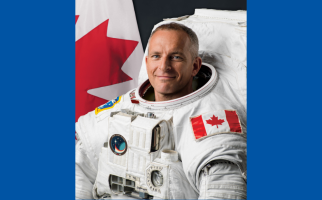Join a revolutionary panel of speakers, including CSA astronaut David Saint-Jacques to explore how rocks can be out of this world!
- What can rocks - both in space and on Earth - tell us about our place in the universe?
- Why do astronauts go through a geology field expedition as part of their training?
- How can rocks in Canada's North help astronauts and experts prepare for upcoming missions to the Moon, and eventually Mars?
- And finally, what kind of careers are connected to sampling and analyzing space rocks?
Tune in to find out!
Agenda:
- Welcome (5 mins)
- Talks by our panelists, (30-40 mins)
- Our panelists answer YOUR questions! (40-50 mins)
- Closing remarks (5 mins)
Panelists:
- Speaker - David Saint-Jacques flew to the International Space Station in 2018, for a 204-day mission, the longest Canadian space mission to date. He became the fourth CSA astronaut to conduct a spacewalk and the first CSA astronaut to use Canadarm2 to catch a visiting spacecraft.
- Speaker - Dr. Gordon "Oz" Osinski is a Professor in the Department of Earth Sciences at the University of Western Ontario. His research focuses on understanding impact cratering as a planetary geological process, on the Earth, Moon and Mars. In September 2023 he was named to be part of the Geology Team for the Artemis III mission, the first mission to return to the Moon in over 50 years.
- Speaker - Patrick Hill is a program scientist in planetary sciences with the Canadian Space Agency (CSA). He contributes to the CSA’s Lunar Exploration Accelerator Program, prepares for the curation for the Canadian portion of the OSIRIS-REx asteroid sample, and manages the Alpha Particle X-ray Spectrometer (APXS) instrument on Curiosity rover. Patrick has participated in numerous public outreach events and loves sharing his passion for meteorites and planetary geology with the public.
- Moderator - Chimira Andres is a Ph.D. researcher with the Department of Earth and Space Science and Engineering at York University, Canada and the Laboratoire de Planétologie et Géosciences in Nantes Université, France. While her school background is in geology, geophysics, and satellite remote sensing, her research focuses on the movement of ice in glacial and periglacial (permafrost) environments on Mars and in the Canadian High Arctic and how ice shapes the landscape over time. She recently worked with the Youth-STEM Team at the Canadian Space Agency and has also previously worked at the European Space Agency with the ESA Education STEM Didactics Team.
Automatically generated closed captioning will be provided for live and recorded webinars.
This event is brought to you by:

